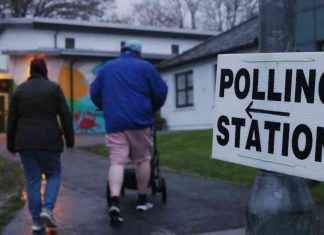If it weren’t for science, there would be no Earth Day.
The first civic observance in 1970 threw a spotlight on the toll that smoke-belching factories, river sludge and oil spills were having on the planet and the life it sustains.
“It’s not that we didn’t notice pollution before,” says Kathleen Rogers, president of the Earth Day Network, the global coordinator for Earth Day. “As a byproduct of 150 years of industrial development, there wasn’t any real deep concern other than annoyance to all these things until we started connecting these things through science to birth defects, asthma, lead poisoning, DDT exposure and all these other things that happen.”
Earth Day, celebrated Saturday, sees people across Southern California coming together at festivals, cleanups and a series of March for Science rallies to continue advocating for a healthy, sustainable future.
These educational events, coordinated under the banner of Earth Day’s three-year campaign for Environmental and Climate Literacy, come as government leaders propose rolling back U.S. Environmental Protection Agency programs aimed at keeping pollution in check.
“Policymakers threaten our present and future by ignoring scientific evidence when crafting policy, threatening scientific advancement through budget cuts, and limiting the public’s knowledge by silencing scientists,” says Caroline Weinberg, national co-chair of March for Science co-organized by the Earth Day Network with satellite marches in nearly 500 cities around the world.
Local marches include 10:30 a.m. at the Coachella Valley Music and Arts Festival in Indio, 9:30 a.m. at the Fullerton City Hall, 10 a.m. at Bixby Knolls in Long Beach, and 8 a.m. on Caltech’s Beckman Lawn in Pasadena.
A large gathering takes place at Pershing Square Park in downtown Los Angeles from 9 a.m. to 4 p.m. with distinguished speakers — including Allison Schroeder, the Academy Award-nominated screenwriter of “Hidden Figures” — focusing on the crucial roles science plays in driving economic growth, preserving the environment and protecting public health.
NPR’s Joe Palca has bigger ideas
At a time when scientific inquiry and rigorous research is under siege, NPR’s Joe Palca remains a keeper of the flame.
Since joining NPR 25 years ago, he’s been bringing to the forefront stories from the depths of the ocean to the outer reaches of space and even co-authored the 2011 book “Annoying: The Science of What Bugs Us” — think soup slurpers, nails on chalkboard and eavesdroppers.
Palca’s current series is “Joe’s Big Idea,” which focuses on topics that elicit an “Oh! That’s interesting” from the award-winning journalist who discusses his beat during a $40 per ticket event hosted by NPR affiliate KCLU 88.3 FM on Sunday at Cal Lutheran University in Thousand Oaks (to purchase a ticket, call 805-493-3900).
“I want people to see it’s not a cynical ploy to extract money from unwitting taxpayers,” Palca says. “It’s this wonderful adventure that is to be shared. We should exalt that as a culture we’re learning about the wonderful world and figuring out stuff that nobody knew before.”
That’s not just his goal but that of Earth Day celebrations in communities throughout Southern California, with most taking place Saturday unless otherwise noted.
Highlights include L.A. Sanitation’s second annual citywide Earth Day L.A, event from 10 a.m. to 2 p.m. in Exposition Park. Nosh on free food, catch the live entertainment and explore the city’s sanitation trucks.
Descanso Gardens in La Cañada Flintridge, meanwhile, celebrates spring with programs focused on the garden, from 9 a.m. to 5 p.m. Saturday and Sunday. The Earth Day and Botanic Bling event, included in admission, features a plant sale, trunk show, gardening workshops, wildflower display and a native garden walk with horticulturist Layla Valenzuela, at 11 a.m. Saturday only.
Santa Clarita rolls out its Earth Arbor Day Festival, from 10 a.m. to 5 p.m. April 29 and 10 a.m. to 4 p.m. April 30 at Central Park in combination with the KHTS Santa Clarita Home and Garden Show, the Emergency Expo and the KHTS Arts and Crafts Fair.
Glendora returns with its free festival, from 9 a.m. to 2 p.m. at the Civic Center. It includes a 41/2 mile bike ride from City Hall at 9 a.m., round-trip shuttles from the Library to the Colby Trailhead and Big Dalton Wilderness areas beginning at 9:15 a.m. and gardening workshops throughout the day.
And in Claremont, eco-friendly tiny home displays, Copali dancers and alternative cars are some of what visitors can encounter from 10 a.m. to 3 p.m. along Second Street in the Claremont Village.
Long Beach hosts several Earth Day festivities, including The Green Prize Festival, the annual award program honoring excellence in sustainability. It takes over Houghton Park from 11 a.m. to 6 p.m. with live music, speakers, a beer garden, marketplace and activities for all ages.
Manhattan Beach hosts its 25th annual celebration and concert, from 11 a.m. to 4 p.m. at Polliwog Park.
Elsewhere, people can enjoy a fun-filled day of science at the Bolsa Chica Conservancy’s annual Bolsa Chica Earth Day Festival, from 10 a.m. to 3 p.m. Visitors can count migratory birds, test water and enjoy guided tours.
“This is not the anti-war movement; this is the middle class and among the 20 million people that came out that first Earth Day we saw millions of scientists … millions,” Rogers says. “What we’re seeing now is the second go-round.”
Our editors found this article on this site using Google and regenerated it for our readers.





